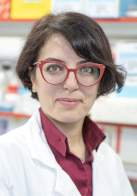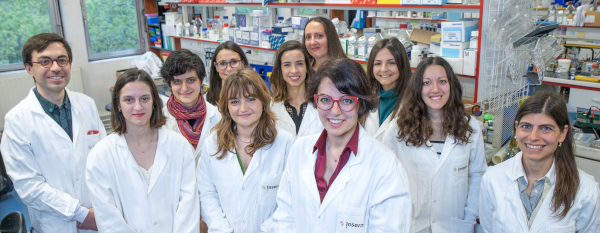
Team leader: Piera Smeriglio
The main goal of our team is to develop new therapies for motor neuron disorders (MND). Our work is focused on spinal muscular atrophy (SMA) and amyotrophic lateral sclerosis (ALS).
The use of viral vectors derived from adeno associated virus (AAV) opened novel perspectives and applications for the treatment of MNDs.
In 2007, M. Barkats demonstrated the high potential of self-complementary AAV serotype 9 (AAV9) to efficiently transduce the central nervous system (CNS) following a systemic injection (Barkats, Patent PCT/EP2008/063297, 2007 and Martine Barkats and AAV9-SMN: from discovery to treatment). Remarkably, the first gene therapy based on this approach – Zolgensma®, – has been recently approved by the Food and Drug Administration (FDA) for the treatment of infantile forms of SMA. This represents a major breakthrough in the field of gene therapy for rare diseases.
Projects
- We are currently optimizing the AAV-mediated gene replacement approach for SMA. Our objective is to develop specific vectors targeting multiple organs affected in the disease. This will likely reduce the potential side-effects of the current therapy on the long term. We are also investigating epigenetic regulation in SMA and motor neuron degeneration. The study of epigenetic hallmarks will provide a comprehensive understanding of the disease and in particular of its different forms. Furthermore, this work will contribute to the identification of novel pathways implicated in the pathophysiology of SMA.
The objective of these projects on the long term is to identify novel therapeutic targets, specific to each SMA patient and to design future personalized medicine approaches. - We are also taking advantage of the therapeutic potential of AAV vectors to find treatments for ALS. In 2017, we developed a therapeutic strategy for ALS caused by mutations in the superoxide dismutase 1 (SOD1) gene. Using an exon-skipping approach through AAV, we induced global decrease in the human mutant SOD1 in the SOD1G93A mouse model (Biferi et al., 2017). This work received the Prize4Life award “THE $1M AVI KREMER ALS TREATMENT PRIZE4LIFE”. We are currently furthering the pre-clinical development of this approach in collaboration with Généthon.
- A big part of our research effort focuses on the development of a therapeutic strategy for ALS and fronto-temporal dementia (FTD) caused by mutations in C9ORF72 gene. This is the most common form of ALS (40% of familial forms and 7% of sporadic cases). The mutation results in a gain-of-function and a loss of C9ORF72 protein expression (Reviewed by Cappella et al., IJMS 2019). Our strategy aims to simultaneously target all the pathological mechanisms, using AAV vectors. We are also generating novel experimental models to better understand the disease.

Team members
Dr Piera Smeriglio, PhD, Researcher, Team leader
Dr Fiorella Grandi, PhD, Researcher
Dr Marina Colella, MD, Clinician
Dr Gorka Fernandez-Eulate, MD, Clinician
Stéphanie Astord, Engineer
Mathilde Cohen-Tannoudji, Engineer
Sonia Pezet, Engineer
Matteo Ernu, Engineer
Dr Julia Lemos, PhD, Post-doctoral Researcher
Dr Liliane Tenorio, PhD, Post-doctoral Researcher
Sabrina Mazzucchi, PhD student
Alice Arnould, PhD student
Elena Gidaja, PhD student
Contact
Piera Smeriglio : p.smeriglio@institut-myologie.org
Last publications
- De Winter J, Van de Vondel L, Bonne G, Stojkovic T, Elouej S, Grandi F, Smeriglio P, Palmio J, Johari M, Hackman P, Savarese M, Udd B, Meyer A, Nicolau S, Flanigan K, Waldrop M, Longman C, Diaz-Manera J, Töpf A, Baets J. Heterozygous SPTAN1 frameshift mutations cause distal myopathy with neurogenic features. NEUROMUSCULAR DISORDERS. 2023;33:S139-S139. doi:10.1016/j.nmd.2023.07.290
- Smeriglio P, Zalc A. Cranial Neural Crest Cells Contribution to Craniofacial Bone Development and Regeneration. CURRENT OSTEOPOROSIS REPORTS. 2023;21(5):624-631. doi:10.1007/s11914-023-00804-8
- Lemos J, Tenório L, Mouly V, Butler-Browne G, Mendes-da-Cruz D, Savino W, Smeriglio P. T cell biology in neuromuscular disorders: a focus on Duchenne Muscular Dystrophy and Amyotrophic Lateral Sclerosis. FRONTIERS IN IMMUNOLOGY. 2023;14. doi:10.3389/fimmu.2023.1202834
- Giorgia Q, de la Banda M, Smeriglio P. Role of circulating biomarkers in spinal muscular atrophy: insights from a new treatment era. FRONTIERS IN NEUROLOGY. 2023;14. doi:10.3389/fneur.2023.1226969
- Carraro U, Bittmann F, Ivanova E, Jónsson H Jr, Kern H, Leeuwenburgh C, Mayr W, Scalabrin M, Schaefer L, Smeriglio P, Zampieri S. Post-meeting report of the 2022 On-site Padua Days on Muscle and Mobility Medicine, March 30 – April 3, 2022, Padua, Italy. Eur J Transl Myol. 2022 Apr 13;32(2):10521. doi: 10.4081/ejtm.2022.10521. PMID: 35421919
- Biferi MG, Cohen-Tannoudji M, García-Silva A, Souto-Rodríguez O, Viéitez-González I, San-Millán-Tejado B, Fernández-Carrera A, Pérez-Márquez T, Teijeira-Bautista S, Barrera S, Domínguez V, Marais T, González-Fernández Á, Barkats M, Ortolano S. Systemic Treatment of Fabry Disease Using a Novel AAV9 Vector Expressing α-Galactosidase A. Mol Ther Methods Clin Dev. 2020 Oct 22;20:1-17. doi: 10.1016/j.omtm.2020.10.016. eCollection 2021 Mar 12. PMID: 33335943 Free PMC article.
- Cappella M, Elouej S, Biferi MG. The Potential of Induced Pluripotent Stem Cells to Test Gene Therapy Approaches for Neuromuscular and Motor Neuron Disorders Front Cell Dev Biol. 2021 Apr 13;9:662837. doi: 10.3389/fcell.2021.662837. eCollection 2021. PMID: 33937264 Free PMC article. Review.
- Cappella M, Pradat PF, Querin G, Biferi MG. Beyond the Traditional Clinical Trials for Amyotrophic Lateral Sclerosis and The Future Impact of Gene Therapy. J Neuromuscul Dis. 2021;8(1):25-38. doi: 10.3233/JND-200531. PMID: 33074186 Free PMC article. Review.
- Agarwal P, Lee HP, Smeriglio P, Grandi F, Goodman S, Chaudhuri O, Bhutani N. A dysfunctional TRPV4-GSK3β pathway prevents osteoarthritic chondrocytes from sensing changes in extracellular matrix viscoelasticity. Nat Biomed Eng. 2021 Mar 11:10.1038/s41551-021-00691-3. doi: 10.1038/s41551-021-00691-3. Online ahead of print. PMID: 33707778
Patents
- Biferi M.G., Cappella M., Barkats M. Antisense sequences for treating amyotrophic lateral sclerosis (AIM). April 2020. EP20169064.1
- Barkats M., Biferi M.G., Voit T. Treatment of Amyotrophic Lateral Sclerosis. (AIM, CNRS, INSERM, UPMC). July 2014. WO2016016449 A1

